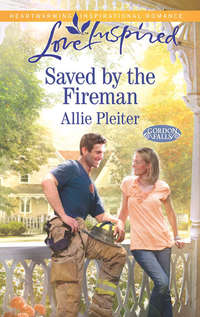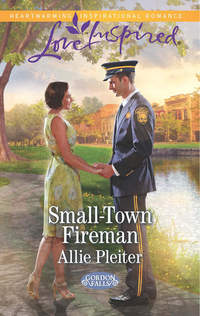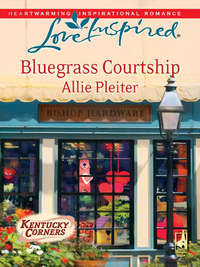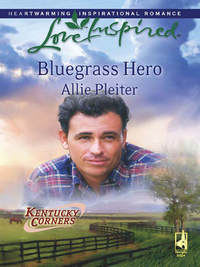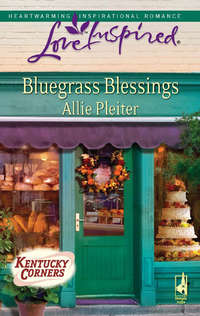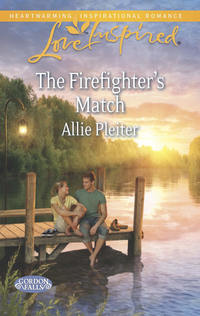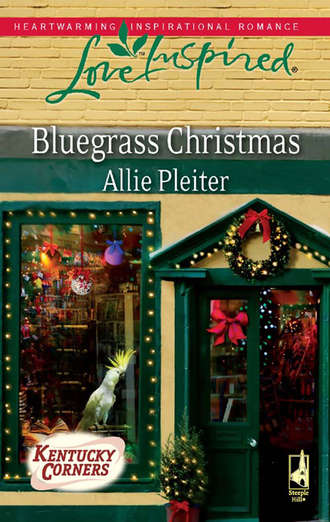
Полная версия
Bluegrass Christmas

“I’m supposed to be the cure for the town, and your cockatoo now?” Mary said as she ran her fingers along the row of CDs to find some new music for the bird.
That was a pretty lousy way to look at it. “I don’t think of it like that,” said Mac.
“That’s how they put it. Something to bring everyone together. A big, splendid Christmas pageant to remind us of peace on earth, goodwill to men and such.”
“I’m sorry you got hired to fix whatever it is people think I broke.”
“I’m not sorry,” she said, handing him a Mozart disc. “But if I get sorry, I’ll make sure you’re the first to know. I think it’s sort of sweet, actually, how much people care about getting along here.”
“If people cared about getting along here, you could have fooled me,” Mac said. “There’s a town hall meeting tomorrow night—come see how much getting along we actually do.”
ALLIE PLEITER
Enthusiastic but slightly untidy mother of two, RITA® Award finalist Allie Pleiter writes both fiction and nonfiction. An avid knitter and nonreformed chocoholic, she spends her days writing books, drinking coffee and finding new ways to avoid housework. Allie grew up in Connecticut, holds a BS in Speech from Northwestern University and spent fifteen years in the field of professional fundraising. She lives with her husband, children and a Havanese dog named Bella in the suburbs of Chicago, Illinois.
Bluegrass Christmas
Allie Pleiter

Better is one day in your courts
than a thousand elsewhere;
I would rather be a doorkeeper
in the house of my God
than dwell in the tents of the wicked.
—Psalms 84:10
For Christina
For who she was, who she is,
and who she will be
Contents
Chapter One
Chapter Two
Chapter Three
Chapter Four
Chapter Five
Chapter Six
Chapter Seven
Chapter Eight
Chapter Nine
Chapter Ten
Chapter Eleven
Chapter Twelve
Chapter Thirteen
Chapter Fourteen
Chapter Fifteen
Chapter Sixteen
Chapter Seventeen
Chapter Eighteen
Epilogue
Questions for Discussion
Chapter One
While “Mac” MacCarthy hadn’t counted on peace and quiet when he returned to his office, he hadn’t anticipated an opera-singing cockatoo, either.
December might not go as well as he planned.
Assuming the only logical explanation, Mac pushed his way through the connecting interior doors of the bakery adjacent to his engineering office. “All right, Dinah, what did you do to him?”
Dinah Rollings, owner of the Taste and See Bakery, looked up from her cash register. “To whom?”
Mac cocked his head toward the racket behind him. “I’ve got Luciano Pavarotti in feathers perched on my credenza. Very funny. Now tell me what you did to Curly so I can hush him up before cats start prowling the alley.”
With both doors open, Dinah could evidently hear the bird. Her face was half surprised, half amused. “Not bad. That’s from The Marriage of Figaro, I think. Didn’t peg you for an opera fan.”
Mac looked quizzically at his smirking neighbor. “You didn’t do this?”
She raised an eyebrow. “No.”
“Gil?” Mac named his best friend who, while no fan of opera, had been known to love a good joke.
“Haven’t seen him.”
“Cameron?” Dinah’s new husband didn’t seem the type, but as a former New York City native, Cameron might have opera in his background. And pranks.
Dinah shot him an incredulous look. “Not a chance. Look, Mac, I don’t know who might have…”
At that moment, Pavarotti—the real one—belted out the aria in question from the stairway between their businesses’ doors. And Curly, Mac’s yellow-crested-cockatoo-recently-turned-tenor, joined in.
The second-floor apartment had been empty since Cameron and Dinah got married. Evidently, it wasn’t unoccupied anymore. Opera music flooded the hallway when Mac opened the door that led upstairs.
Dinah came to the door. “Okay, maybe I do know who could be…”
Curly chose that moment to chase his avian muse, leaving his perch in Mac’s office to bolt up the stairway in a squawking white streak of feathers and falsetto.
Mac took the stairs three at a time, ruing the fact that repairmen at his house necessitated that Curly spend this week at the office with him. Curly almost never bolted, but when he did, he went full out. Nothing good could come from this. Mac was a few steps from the top when he heard the shriek.
Taking the last risers in two strides, Mac looked in the apartment door to find a blond woman cowering behind a music stand, holding what looked like a conductor’s baton as if it were a broadsword. The operatic waltz blared from a set of speakers on either side of the room, and Curly stood ducking and bobbing in time with the music from atop a bookcase to Mac’s right.
“What is that thing?” she said over the loud music. Actually, shouted might have been more accurate. Shouted with great annoyance. Curly wasn’t a small bird, and he looked like an invading white tornado when he flew anywhere. Mac could only imagine how frightening, at first sight, it was.
“That’s Curly,” Mac introduced, feeling ridiculous as he yelled above the orchestration. “He won’t hurt you. He seems to get a kick out of your music.”
Her eyes were wide. “It’s not mutual. Get him out of here.” She seemed to realize how harsh she sounded, for a split second later she nervously inched over to the stereo and turned down the volume before adding “Please.”
“Aww,” Curly moaned as the music quieted down. That was pretty tame considering all the smart-aleck replies Mac had taught the bird over the years.
Dinah burst through the doorway behind Mac. “Mary! Are you okay?” She went over to her, while Mac called Curly down off the furniture. “I’m sure that’s not the welcome you were expecting.”
She had every right to be annoyed. Mac’s own ma could get spooked by Curly on occasion, and she knew what to expect from the feathered comedian. Curly had the good sense to look sorry for his actions, putting his head down and trying to hide under Mac’s arm. “I’m okay, I think,” Mary said shakily. She was a pale thing, with ice-blue eyes and hair only a shade sunnier than Curly’s snow-white coat. “No damage done, unless you count my nerves.”
Dinah took her arm. “Mary…it’s Thorpe, isn’t it? Mary Thorpe, this great ferocious beast is Curly. And this is Mac MacCarthy. Sorry you had to meet under such goofy circumstances.”
“I’m really sorry about this. Curly’s usually more civilized, and he’s hardly ever in my office. And he’s never gone bananas over…um…whatever you were playing…before. I didn’t even know you were up here.”
“It’s okay,” she allowed, but it didn’t sound like she meant it.
“Curly,” Dinah addressed the guilty bird, “you just scared the pants off Middleburg Community Church’s new drama director.”
Serves Mac right for skipping church to go to a special service with Gil and the guys from Homestretch Farm last Sunday. Gil ran a unique reform program on his horse ranch, and occasionally “the guys”—as the juvenile offenders were known around town—visited churches in their old neighborhoods. Still, Mary didn’t look like the kind of person Mac thought would be leading drama at MCC. Actually, he didn’t even know MCC was planning a dramatic performance. Since his decision to run for mayor against “lifetime incumbent” Howard Epson, hadn’t Middleburg seen enough drama without having to make more? Not that anyone could be judged by how they weathered a cockatoo air strike, but this Mary seemed a little small and frail for the job. Mac had seen herds of mustangs more compliant than the MCC congregation. “Brave soul. Sorry you had Curly here for a welcoming committee.”
At the mention of his name, Curly poked his head up and gave Mary a wolf whistle. Dinah laughed. Mac rolled his eyes and thought about getting a dog.
“Are you an opera buff?” Mary asked Curly, putting the baton thing down.
“Not until today,” Mac replied. “I’ve never seen him do that before. He usually just bobs around when I play Bill Monroe.”
Mary gave him a blank look.
“Bluegrass music. Curly’s more used to that than…”
“Mozart?” she offered. She shrugged. “I give him points for good taste.”
“And bad manners,” Mac added as he nodded at the bird. “Say goodbye, you rascal.”
“Bye bye,” Curly squawked, winking one large black eye.
“I’m really sorry again. Welcome to Middleburg. I’ll keep Curly under tight surveillance for the rest of the week until the repairmen are gone at my house.” Mac shifted Curly to his left hand and extended his right.
She shook it. Her fingers were small but very strong. “I’ll turn down the volume so he isn’t tempted again.”
Mac glared at Curly. “Tonight we bring your other cage over here. No more free flying around the office for you, bud—repairmen at home don’t buy you a license to make trouble here for the neighbors.”
“Happy Birthday, by the way,” Dinah announced as they made their way downstairs. “Park your bird and come on over for some mint chocolate chip biscotti. You need them.”
No one ever really needed anything from Taste and See, but Dinah was very good at making people think they did. The woman’s trademark enthusiasm had only doubled since she had married Cameron Rollings, who used to live in the apartment Mary now occupied.
“My birthday’s not for another twenty-nine days, Dinah.”
“It’s December first, so it’s the first day of your birthday month. Close enough.”
Mac furrowed his eyebrows. “You’re not going to say that every day from now until the thirtieth, are you?”
“Whassamatta?” Dinah teased, reviving her native New Jersey accent. “The passing decade getting to you?”
Sure it was, but that’s not the kind of question he was going to get into with armchair therapist-baker Dinah Rollings.
“No,” he said, applying a smirk. “Turning thirty is not fatal. Not yet.”
Mac had barely settled at his desk when he saw his mother press her face against the glass window of his front office. She yanked open the door and stood in the entryway, one hand on each hip, a look of utter disgust on her face.
“I can’t take much more of this nonsense,” she said as Mac’s father filed in behind her. “Land sakes. If one more person looks at me sideways just because you up and ran for mayor…”
Mac stood up. His mama was in the room, after all. He had manners, even if his bird didn’t. “I sort of thought all the ruckus would die down when the holidays got here.”
Pa walked over to sit in the guest chair of Mac’s office. “If you ask me, it’s just gotten worse.” He shook his head in a combination of disbelief and amusement. “Y’all know what you got into?”
“Yep.”
He did. God had hounded him for months. He had very good, very personal reasons for taking this unconventional step. He was no stranger to wild ideas like this, anyway. As a matter of fact, Mac preferred to shun the norm whenever possible.
Which often drove his mama nuts.
Ma waved her hands in the air. “As if this campaign weren’t enough. Now there’s this Christmas pageant. I thought they were just off their rockers thinking that hiring some Christmas drama director would help mend fences. You know Howard’s already announced that he’s gonna be in the play, don’t you? You’ll have to as well, to keep Howard from getting the upper hand.” She blew out a breath and shook her head. “This won’t be a distraction, it’ll be a disaster.”
As far as Mac was concerned, it already was.
Mary Thorpe stood in the empty sanctuary of Middleburg Community Church and whispered a prayer of praise. I’m here. Oh, Lord, it’s amazing, what You’ve done. I’m here. The place was just what she’d envisioned; a steepled white church with a blue door on a rolling hillside with an old organ and wooden pews that had seen decades of worship. It even had a preschool attached—something she loved. This afternoon, she’d heard a tiny-voiced rendition of “Jesus Loves Me” that made her heart bubble up in happy relief. This is it. A real Christmas.
She inhaled. The place was infused with a wholesome, old-fashioned atmosphere. She ran her hand across a chipped, aged music stand and thought of the soprano soloist catfight she’d witnessed at her previous part-time job as the second chair violinist at a Chicago opera company. Not to mention the near nuclear-level war between coworkers at her other temporary job at an advertising agency, and thought “no more.” She picked up a battered hymnal from a nearby pew. From now it’ll all be “Peace in the Valley.” It’s perfect.
“Are you ready?” Pastor Dave Anderson’s voice broke her reverie as he came up the aisle beside Mary. “Most folks were reluctant to do this drama at first, but Sandy Burnside, Howard and the other church elders convinced them.” Anderson folded his arms across his chest and inclined his head toward Mary. “Still, y’all ought to be warned—they’re an opinionated bunch, my feisty flock.”
Mary tossed her blond ponytail over her shoulder and put her hands on her hips. “You haven’t seen the MidAmerican Orchestra String Section. Opinionated doesn’t even begin to cover it. I’m ready to handle this.”
“You know,” the pastor amended, handing her a dozen copies of the nativity script they’d agreed upon, “I think maybe you are.” He winked and crossed the sanctuary to his office.
Mary sat down on the pew and smoothed her hand over the stack of scripts. Middleburg was everything she’d prayed for. Her new address—Ballad Road—charmed her, dotted with shops and diners. And all the streets had musical names! Walking here, she had passed a quaint park with a sign that read “Tree Lighting, Wednesday, 7:00 p.m., Bake Sale to follow.” Tree lighting. Bake sales.
God, in His wisdom, had led her to the middle of nowhere. The absolutely perfect place to disappear.
Chapter Two
This Sunday was just like his last Sunday at MCC; half the congregation avoided him in the church parlor after Sunday service. Dodging a sour look from Matt Lockwood, Mac focused his attention on Mary Thorpe. “Dinah told me you took cream and sugar,” he explained, handing her a cup of coffee.
“She’s nice. My apartment smells fabulous every morning, but I may put on ten pounds before New Year’s.” Mary smiled and waved to another member of the congregation. “They are an interesting bunch. Hey, I hear you’re one of the reasons I’m here. Well, you and Howard Epson. The campaign and all. I thought I’d seen seriously dramatic local politics back in Chicago….”
Mac shrugged. “I’m not asking him to stop being mayor. I’m just asking to be a choice. We haven’t had a choice for mayor since I was in high school. I think I’d do a great job, but if Howard wins, I’ll actually be okay with it.”
Mary took a sip of coffee and seemed to consider him.
Okay, it was sort of a cheesy speech, but that’s really how he felt. He didn’t want to start talking like a politician just because he ran for mayor, but lately stuff like that just jumped out of his mouth. “No really,” he went on, not liking how she narrowed her eyes, “if people still want Howard, then that’s what Middleburg should get. But they should think about whether they still want Howard.”
“Speaking of what the people want, you do know you’re both supposed to be in the production? Pastor Anderson told you, didn’t he?”
“Oh, I’ve heard. I think I can manage something along the lines of third shepherd from the left.”
She looked a bit tense. “Um, it’s more involved than that. You’ve got a starring role. You’re Joseph.”
While Mac didn’t like the idea of playing such a large role, he was sure Howard would be even less pleased. “And what about my worthy opponent?”
“Oh, we found the perfect part for him.” She offered a weak smile. “He’s God.”
Mac stood in the barn at Homestretch Farm, having just finished a hearty Sunday dinner with Gil and his wife, Emily. After the meal, Gil had invited Mac to join him as he took care of a few things around the farm. That usually meant Gil had something on his mind, and Mac wasn’t that surprised when Gil cleared his throat and sat down on a hay bale. “Emily said you got in another row with Howard at the diner.”
Mac bristled. “You’d think I’d decided to do something life-threatening the way he and other folks talk. Everybody’s always groaning about Howard, so why am I the first person willing to do something about it?” Mac had amazed even himself by how defensive he’d become on the subject. Running for Middleburg mayor did not qualify as a suicide mission. Still, when he announced his candidacy a few weeks back, people looked at him as if he’d just thrown himself on the end of a spear. They still did.
Gil fiddled with the large ring of keys he always carried. He had a habit of clanking them against his wedding ring. “You’ve showed me ads for four new cars in the last three months. New cars start catching your eye when you get antsy.”
Mac rolled his eyes. “You’ve been reading Emily’s magazines with all those quizzes or something. Wanting one new car does not constitute a midlife crisis. Pre-midlife crisis, rather,” Mac corrected, as his grandfather was now in his late nineties and still remarkably sharp. He leaned back against a hay bale. “What are you getting at?”
“You like to stir up trouble, Mac. Always did. And a man with a weird bird and a fast sports car could just be scouting the next diversion.” Gil looked serious.
“Meaning?” Mac knew lots of people who changed cars every two years.
“Are you running for mayor because it’s what you want, or just because it’ll get under everyone’s skin?”
Mac was fully aware of his tendency toward shock value. He certainly could have thought he’d heard the Lord tell him to run for mayor when it might just be his appetite for ruffling feathers.
The truth was, actually, that Mac had been feeling restless. “Okay,” he admitted to Gil, “I’m…how’d you put it? Antsy. But running for mayor isn’t about that. I sat on this a long time. God’s been after me for months, and yeah, I wasn’t so sure it wasn’t just me looking for a new thrill at first.” It was something larger than that, something harder to explain. As Mac stared down the barrel of his thirtieth birthday, it felt as if life was sucking him into the expected routine. As if everyone else had figured out who he was supposed to be except him. He had no desire to “settle down” at the moment, but lots of folks—Ma chief among them—viewed him as simply staving off the inevitable. Predictability and inevitability chafed at Mac like he’d seen one of Gil’s unbroken horses react to a bit in their mouths. If staying “unsettled” got under everyone’s skin, they’d just have to get used to it.
“Only you,” Gil said, “would think of running for mayor as ‘a thrill.’ Couldn’t you just buy a horse or find a girl or something?”
Mac groaned.
“Relax, MacCarthy, I’m just pressing your buttons. I’m not out to trash your freewheeling, nonconformist lifestyle. Not that your mama hasn’t asked me—repeatedly—to yak at you about the virtues of marriage. I just mostly want to know you’re in the right place about this.”
“That’s just it. I’m not in the right place. I’m supposed to be someplace else.”
Gil raised an eyebrow. Mac had been in Middleburg his whole life.
“Not geographically. Ever heard of a metaphor? I’m restless on the inside. Things don’t feel comfortable any more. Or too comfortable, I don’t know. I don’t want to fade into the landscape here. Fall into some predictable rut. I really want this. I think I’m the guy, Gil. You know I’ve got a lot of ideas, and I think it’s high time Middleburg even remembered they had a choice when it comes to a mayor.”
“Sounds like a campaign slogan to me.”
Mac was growing irritated by the fact that every time he voiced a well-phrased or complex idea, someone said “sounds like a campaign issue” or “that could be your campaign slogan.” Middleburg’s mayoral race wasn’t large enough to even warrant a slogan. He didn’t want to be the kind of guy whose civic agenda could fit on a bumper sticker.
“There are lots of ways to stand out in the world that doesn’t cause so much trouble.” Gil folded his arms across his chest. “You’ve hashed this out? Seriously?”
By “hashing something out,” Gil meant praying over it. Seriously. Gil Sorrent took his job and his faith very seriously. It’s what had made him able to withstand the tremendous pressures and setbacks of the criminal rehabilitation farm he ran. It’s what made him the kind of man who didn’t mince words and never let down his friends. “Yes,” Mac replied, and he had. He’d felt like he’d wrestled forever with this decision to run. His ability to shake things up had led him down a few wrong turns over the years, and this seemed like a chance to finally channel that “talent” into something useful. To make his mark on the world before he slid into the bland predictability of…gasp…middle age. Shaking up was a far better choice than settling down, and this was a perfect opportunity to shake up for the good of Middleburg.
Gil took his answer at face value. Their friendship had lasted long enough to put sugarcoating or lying out of the question. “And you’re sure?”
“Yes, I’m sure.”
Gil sat back in the hay. “Well, you’ve actually got the personality to pull it off. Mostly. Emily’ll burst out laughing the first time she has to say ‘Your Honor’—I’m glad I don’t have to.” Emily and Gil had been on the city council before they’d married, and Gil had been the one to step down because spouses couldn’t both remain in office.
“Maybe my first official duty will be to change that silly protocol.” Mac gave his friend a nudge. “It might be worth it just to hear you say “Your Honor’ to me. Who knew I’d have to run for office to get any respect from you?”
Gil stretched a foot out in front of him. “I haven’t said I’d vote for you yet. Howard’s a bit hard to take sometimes, but he does a halfway decent job.”
“You complain about Howard all the time. We spent half your time on the council fighting Howard.”
“That’s just it. When you’re mayor, who will I have to complain to?”
“Maybe you won’t have to complain at all. Have you considered that possibility?”
Gil grinned. “Not in the slightest.”
Mary waved back at yet another person as she made her way up Ballad Road toward her apartment, half spooked and half amazed by how quickly she’d come to feel at home. So many people believed in God here. And not just the Sunday kind of belief. These were day-in, day-out believers. It was the perfect place for her to grow her shaky new faith.
Almost from the time she had committed her life to Christ, Chicago had begun to vex her. Her earlier jobs—however enviable—felt hollow and unsatisfying. Her own parents had trouble understanding how anyone could leave an orchestral position and freelance ad agency work to lead a Christmas drama, but it was just too hard to be a new Christian in her other world. That verse about “rather be a gatekeeper in the house of my God” kept running through her head. A fresh, humble start felt so much easier.
She stopped at the window of an adorable shop called West of Paris. A charming blue glass vase caught her eye. A housewarming gift for myself, she thought, picturing it with a few sprigs of holly on her tiny dining room table. She couldn’t pull off a decorated tree this Christmas, even if her mom and dad came as planned, but the vase seemed just enough of a luxury to suit her mood. As she entered, a wave of wonderful scents and music-box Christmas carols washed over her.



